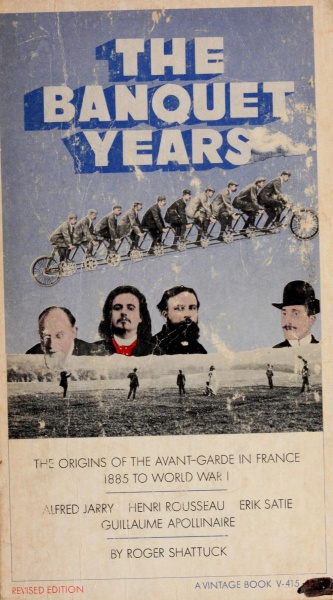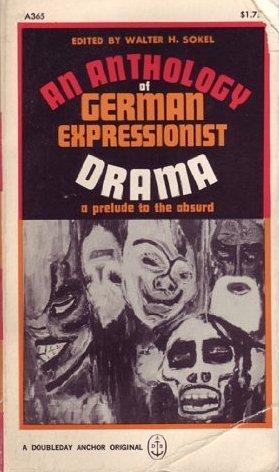Roger Shattuck: The Banquet Years: The Origins of the Avant-Garde in France, 1885 to World War I., Rev. ed. (1955/1968)
Filed under book | Tags: · 1880s, 1890s, 1900s, 1910s, absurd, anarchism, art, art history, avant-garde, cubism, dada, dreams, france, literature, logic, montage, music history, painting, pataphysics, poetry, theatre, typography

In this book Roger Shattuck portrays the cultural bohemia of turn-of-the-century Paris who carried the arts into a period of renewal and accomplishment, and laid the ground-work for Dada and Surrealism.
“…Then came the idea–a kind of gambler’s hunch–that the trio Rousseau-Satie-Apollinaire represented several significant aspects of the period and could reveal them better than any single figure. The idea would not die. [..] Jarry had forced his way into the group and established himself close to the center of things. He helped clarify my underlying subject: how the fluid state known as bohemia, a cultural underground smacking of failure and fraud, crystallized for a few decades into a self-conscious avant-garde that carried the arts into a period of astonishingly varied renewal and accomplishment. [..] An enormous amount has been written on this era and these men since the first edition of this book in 1958. I have taken account of some of it by changing those passages where new facts have come to light.” (from the Preface to this edition)
First published in 1955
Publisher Vintage Books, 1968
397 pages
Review (Alfred Kazin, The Reporter, 1958)
Review (Sidney Tillim, College Art Journal, 1959)
Review (Justin O’Brien, The Saturday Review, 1958)
PDF (115 MB, no OCR)
Comment (0)Richard Kostelanetz: Dictionary of the Avant-Gardes (1993–)
Filed under book | Tags: · abstract art, aesthetics, art, art criticism, art history, art theory, avant-garde, dance, electroacoustic music, electronic music, experimental film, film, literature, mail art, music, music history, painting, performance art, poetry, radio art, sculpture, theatre, video, video art, visual poetry

“This book elucidates, celebrates, enumerates, and sometimes obliterates achievers and achievements in the avant-garde arts. Although it runs from A to Z, it could as easily have been written from Z to A (or in any other order you might imagine) and may be read from front to back, back to front, or point to point. It is opinionated, as all good dictionaries should be, but it is also inclusive, because there can never be just one avant-garde.
Blake • Rimbaud • Apollinaire • Stein • Cage • Lichtenstein • Tatlin • Keaton • Captain Beefheart • Hologram • Text-Sound Texts • Strobe Light • Grotowski • Soho • Micropress • Electronic Music • Reinhardt • Pound • Performance • Postmodern • Duchamp • Fuller • Oldenberg • Paik • Armory Show • Reich • Cunningham • Copy Culture • Pattern Poetry • Bread and Puppet Theatre” (from the back cover)
With contributions by Richard Carlin, Geof Huth, Gerald Janecek, Katy Matheson, H.R. Brittain, John Robert Colombo, Ulrike Michal Dorda, Charles Doria, and Robert Haller.
Publisher A Capella Books, an imprint of Chicago Review Press, 1993
ISBN 1556522029
246 pages
PDF
2nd edition (2000, 47 MB, added on 2020-3-18)
New additions (2011) selected for Soanyway by Derek Horton (HTML)
Walter H. Sokel (ed.): An Anthology of German Expressionist Drama: Prelude to the Absurd (1963)
Filed under book | Tags: · expressionism, literature, theatre

“The literary upheaval that spread through Europe in the first decades of the 20th century found its distinctive form in German Expressionist drama, one of the forerunners of the modern Theatre of the Absurd. The movement was characterized by revolt against prevailing mores and institutions, an attempt to capture the subliminal suggestiveness of the dream, and by extremism. This anthology, selected by Walter H. Sokel, Associate Professor of German Literature and Humanities at Columbia University, illustrates the common preoccupations and the strikingly different techniques of the movement. Among the plays are:
Reinhard Sorge’s The Beggar, Carl Sternheim’s ‘comedy’, The Strong Box, two plays by the expressionist painter Oskar Kokoschka, Murderer the Women’s Hope and Job, Georg Kaiser’s Alkibiades Saved, Walter Hasenclever’s Humanity, Yvan Goll’s The Immortal One, and Rolf Lauckner’s Cry in the Street. The last play, Brecht’s Baal (appearing here for the first time in English in a translation by Eric Bentley and Martin Esslin) clearly indicates the direction to be taken by Brecht himself, and by others, and points the way to the spirit of Camus, Genet, and the nihilism of the mid-century.
Four manifestoes on their art by Kaiser, Ludwig Rubiner, Paul Komfeld, and Goll preface the collection, and in his detailed Introduction, Professor Sokel explores the social and literary origins of the works and interprets the playwrights’ aims and techniques to give a clear and comprehensive definition of the genre.” (from the back cover)
Translated by Walter H. Sokel, Joseph Bernstein, Michael Hamburger, Jacqueline Sokel, Maurice Edwards, Valerie Reich, Bayard Quincy Morgan, Eric Bentley and Martin Esslin
Publisher Anchor Books, Doubleday, Garden City/NY, 1963
367 pages
via leninbert
Review: Leonard Quirino (Modern Drama, 1965).
PDF (16 MB)
Comment (0)
